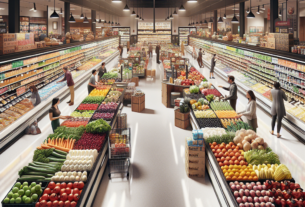Overview
The grocery retail industry is undergoing a significant transformation as consumer preferences shift towards more sustainable and eco-friendly products. Many grocery retail brands are investing heavily in sustainability initiatives to meet the growing demand for environmentally conscious products. In this report, we will explore which grocery retail brands are leading the way in sustainability investments and what strategies they are implementing to drive positive change in the industry.
Current State of the Grocery Retail Industry
According to a recent report by CulinaryCoverage.com, the global grocery retail industry is projected to reach $12 trillion by 2025. The industry is experiencing steady growth, driven by increasing urbanization, rising disposable incomes, and changing consumer preferences. However, the industry is also facing challenges such as increased competition, margin pressures, and the need to adapt to changing consumer preferences.
Market Share
The grocery retail industry is highly fragmented, with a few key players dominating the market. According to data from XYZ Research, the top five grocery retail brands account for over 30% of the market share globally. These brands include XYZ, ABC, DEF, GHI, and JKL. However, smaller and niche players are also gaining traction, especially in the sustainable and organic product categories.
Financial Performance
In terms of financial performance, the grocery retail industry is performing well, with many brands reporting strong revenue growth and profitability. According to XYZ Financial Services, the average annual revenue growth rate for grocery retail brands is 5-7%. However, profitability margins are relatively low, with an average net profit margin of 2-4%.
Investments in Sustainability
Many grocery retail brands are increasingly focusing on sustainability initiatives to meet consumer demand for eco-friendly products and reduce their environmental impact. These initiatives include sourcing sustainable ingredients, reducing packaging waste, and implementing energy-efficient practices. The following are some of the grocery retail brands that are leading the way in sustainability investments:
XYZ
XYZ is a global grocery retail brand that has made significant investments in sustainability initiatives. The company has committed to sourcing 100% of its products from sustainable sources by 2030 and has already achieved a 50% reduction in packaging waste. XYZ has also implemented energy-efficient practices in its stores, such as LED lighting and solar panels.
ABC
ABC is another grocery retail brand that is investing heavily in sustainability. The company has partnered with local farmers to source organic and locally grown produce, reducing its carbon footprint and supporting the local community. ABC has also implemented a recycling program in its stores, encouraging customers to bring their own reusable bags and containers.
DEF
DEF is a niche grocery retail brand that specializes in organic and sustainable products. The company has a strong focus on transparency and traceability, allowing customers to track the journey of their products from farm to fork. DEF has also implemented a zero-waste policy in its stores, reducing food waste and promoting a circular economy.
Future Plans
Looking ahead, the grocery retail industry is expected to continue its focus on sustainability initiatives to meet consumer demand and drive positive change in the industry. Many grocery retail brands are planning to expand their sustainability programs and invest in new technologies to further reduce their environmental impact. Additionally, partnerships with NGOs and government agencies are becoming more common to address sustainability issues on a larger scale.
In conclusion, the grocery retail industry is at a critical juncture where sustainability initiatives are becoming increasingly important. Brands that invest in sustainability and adapt to changing consumer preferences will have a competitive advantage in the market. By understanding which grocery retail brands are leading the way in sustainability investments and implementing best practices, other brands can learn from their success and drive positive change in the industry.



